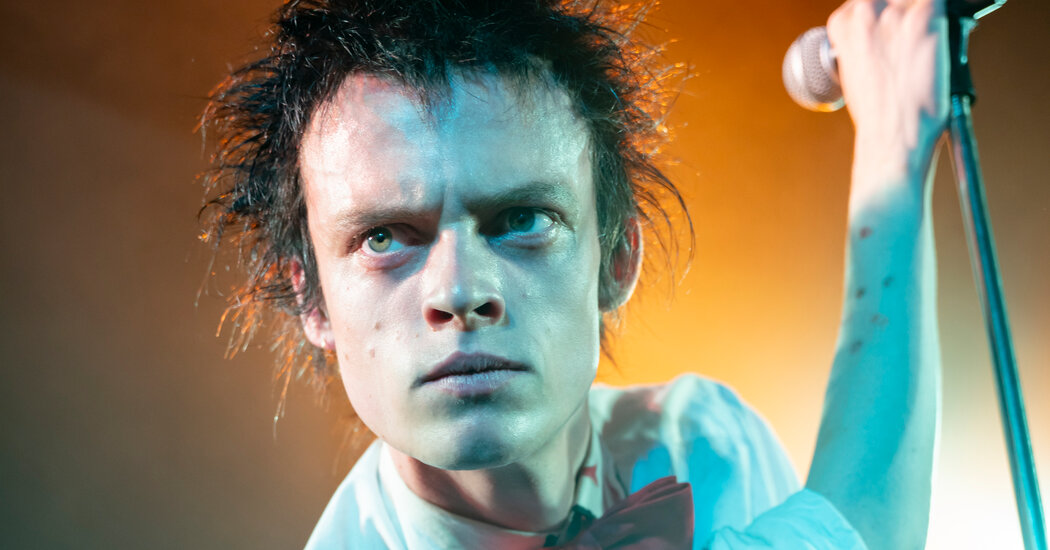
Punk is something you can study in school these days. Students across the world earn class credit with essays examining the movement and its legacy. My niece learned about punk in the British equivalent of ninth grade. And I teach punk-related topics like DIY at California Institute of the Arts. So when I watched FX’s “Pistol,” Danny Boyle’s new limited series about the Sex Pistols, I couldn’t help looking for “teachable moments” to bring up in class next year.
“Pistol” is essentially a period costume drama based on “Lonely Boy: Tales from a Sex Pistol,” a memoir by the guitarist Steve Jones, set in 1970s London. Unlike a documentary, a drama must carefully ration its expository moments, avoid anything that feels like a lecture. But if Boyle and the show’s creator, Craig Pearce, wanted to recreate the historical moment rather than just serve up a cosplay commemoration, they needed to convey the sociopolitical context that fired punk’s ire. Here’s where “Pistol” fell short: It’s hard to see how a young 21st-century person could come away with a true sense of just how threatening the Sex Pistols and the punk movement felt to the establishment.
One technique Boyle uses is to punctuate the narrative with vintage real-life footage of a declining and disunited kingdom in the mid-70s — fusty pageantry and the oblivious elite are contrasted with striking workers and urban deprivation. I winced at the frequent use of an anachronistic cliché that’s become obligatory in punk docs and dramas alike: mounds of black garbage bags piled up all over London. It’s a reference to a garbage collectors strike, but that actually took place in early 1979, several years after the events depicted in “Pistol.” Poetic license, maybe: The rubbish mountains symbolize a country falling apart.
Yet no punk anthem ever cried out for more efficient local government. If anything, punk exulted in scenarios of collapse and chaos. It’s worth pointing out that the movement didn’t emerge in response to Thatcherism (another cliché in punk docs) but erupted during a period of Labour government, against a backdrop of hobbled and ineffective socialism. Its initial politics were inchoate: Punks kicked against authority, but also used the word “liberal” as an insult.
Punk also lashed out at a different kind of status quo: the previous generation’s stadium rock pomp and self-indulgent hippie meanderings. The music of the punks’ older siblings had become its own smug alternative establishment. Snippets of prog rock keyboardist Rick Wakeman performing a stage spectacular in a ridiculous costume are deployed in “Pistol” to represent the decadence into which the 1960s generation had fallen.
But would a younger viewer today understand the stakes here? What does it mean when Sid Vicious brutalizes Bob Harris, the bearded, soft-spoken host of “The Old Grey Whistle Test,” BBC television’s haven for prog, folk and singer-songwriters? Punks bitterly remembered when the New York Dolls performed on the show and Harris smirkingly dismissed the proto-punk band as “mock rock.” But I’d imagine a teenager today would find the attack mystifyingly disproportionate. Taking sides within music so virulently probably doesn’t compute to kids who’ve grown up in the streaming culture, where you can sample every genre and era.
“Pistol” is graphic about the violent side of punk. Sid Vicious gashes his own chest with a broken bottle at a concert during the group’s chaotic tour of America in 1978. Later that year, the bassist, a heroin addict, stumbles into the Chelsea Hotel bathroom and finds his girlfriend, Nancy Spungen, slumped in a pool of blood. (The series dodges the question of whether this was murder or, as one theory went, a suicide pact that went awry.) But the sheer shock of punk’s sadomasochist imagery and actions is hard to recreate today. Over the decades since, we have seen much more outrageous behavior — onstage and offstage — from pop stars. Troubled kids slashing themselves up in public is a plot point in “Euphoria.”
The series skips the physical assaults on the band from Royalists outraged by the single “God Save the Queen” — an odd omission, given that it would have imparted a sense of the fear and loathing that the Pistols triggered in the British public. While punks committed symbolic violence through their appearance, music, graphics and lyrical provocations, it was they who were overwhelmingly the target of fists, boots and blades wielded both by regular citizens and by members of other youth subcultures (like the reactionary Teddy Boys). Ari Up, the singer of the Slits, once told me about being stabbed by a normal, disco-going youth and saved from serious injury only by her thick coat. Even as late as 1983, it could be risky to look even vaguely punky, as I learned after leaving a Killing Joke concert in a provincial English town and getting chased by a gang of taunting youths throwing bottles at my head.
Now, 45 years after 1977’s Summer of Hate — when “God Save the Queen” railed against the “mad parade” of Queen Elizabeth II’s Silver Jubilee — punk itself is an engine of nostalgia. More anniversarial than adversarial, it’s caught up in commemorative cycles, dragging out the same familiar but increasingly haggard faces, voices and anecdotes for a fresh round of exhibitions, documentaries and magazine retrospectives. First-wave punk bands tread the boards still. Some reformed after an interval, others had simply never stopped in the first place. The Damned vowed “I’m gonna scream and shout til my dying breath / I’m gonna smash it up til there’s nothing left” but settled instead for singing “Smash It Up” onstage into their 60s. If you want to hear the Stranglers’ golden oldies, you can go to a gig by what’s left of the band or to a concert by their estranged original singer, Hugh Cornwell, who has said “we’re all tribute bands now.”
Because of my age, nationality and rock critic background my social feeds teem with people who have a stake in the Sex Pistols’ story. Either they were there, right in the thick of it, or involved in the postpunk fallout of independent labels and fanzines. Reading the tweets and Facebook posts, I found myself wondering how those who were parents would explain the significance of this supercharged moment in rock history to their kids without getting a shrug and an eye-roll.
My youngest son is 16 — the same age as me when I got into the Sex Pistols. Having elected to watch “Pistol” on his own, without the dubious benefit of my real-time annotations, he enjoyed the series (the look of it, the music) but admits, “I didn’t really get the importance of it. Didn’t seem so life-changing.”
Partly it’s because things that were once shocking have become commonplace and acceptable. The F-bombs Steve Jones dropped during prime time are now everyday occurrences on cable and streaming television. Having dressed as a punk for Halloween as an 8-year-old, my son found it hard to imagine that “people were once genuinely scared of that look.”
“I get pissed, destroy!” vowed John Lydon in “Anarchy in the U.K.” But chaos probably doesn’t have the same allure to youth in these unstable times. Lydon himself has renounced anarchy, distancing himself from those “spitefully wanting to wreck everything for no reason at all” and pledging allegiance to “a community called the human race and an even tighter community called culture.” He even has warm words for the Royals, declaring that he’s “really, really proud of the Queen for surviving and doing so well.”
The musical antagonisms that defined punk have also faded. Once punks scorned the Boring Old Farts, their cruel nickname for the Stones/Led Zep/Who generation (at the time in their late 20s or early 30s). Lydon now admits that despite having legendarily scrawled “I Hate …” on his Pink Floyd T-shirt, he loves “Dark Side of the Moon.” Steve Jones recently revealed he’d rather listen to Steely Dan than punk rock.
Maybe, with the political context so remote in time and with the original historical actors reversed on their former fierce stances, there really is nothing to learn from the punk adventure: It was just an unrepeatable episode. Still, my youngster came away with one inspirational lesson. Even though he has zero interest in forming a band, watching “Pistol” convinced him that if someone did ask him to join a group, he would say yes. “After looking at those Sex Pistol guys,” he said, “I realized you don’t need to be able to play. Anyone can do it.”




